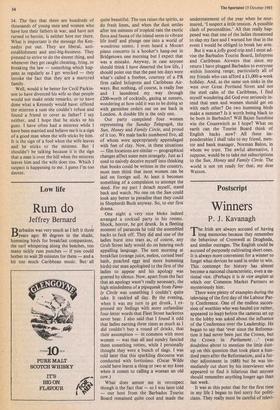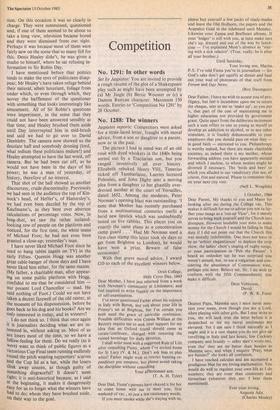Postscript
Winners
P. J. Kavanagh
The Irish are always accused of having long memories because they remember the behaviour of Cromwell at Drogheda, and similar outrages. The English could be accused of purposely cultivating short ones. It is always more convenient for a winner to forget what devices he used in order to win. This contempt for history has almost become a national characteristic, even a na- tional vice. (Perhaps it is le vice anglais at which our Common Market Partners so mysteriously hint.
There were plenty of examples during the televising of the first day of the Labour Par- ty Conference. One of the endless succes- sion of worthies who was hauled (or rather, appeared to leap) before the cameras set up in the lobby was asked about the influence of the Conference over the Leadership. He began to say that 'ever since the Reforma- tion it had never been just the Crown, but the Crown in Parliament...' (was doubtless about to mention the little dust- up on this question that took place a hun- dred years after the Reformation, and a fur- ther adjustment in 1688) but he was im- mediately cut short by his interviewer who appeared to find it hilarious that anyone should remember anything longer ago than last week.
It was at this point that for the first time in my life I began to feel sorry for politi- cians. They really must be careful of televi- sion. On this occasion it was so clearly in charge. They were summoned, questioned and, if one of them seemed to be about to take a long view, television became bored and they were dismissed from our sight. Perhaps it was because most of them were fairly new on the scene that so many fell for this. Denis Healey didn't, he was given a studio to himself, where he sat refusing in- formation to Sir Robin Day.
I have mentioned before that politics tends to make the eyes of politicians disap- pear; Mr Healey's have taken refuge behind their natural, albeit luxuriant, foliage from under which, or even through which, they survey the bafflement of the questioner with something that looks interestingly like amusement. All of Sir Robin's questions were impertinent, in the sense that they could not have been answered sensibly at that time, and Healey brushed them aside until Day interrrupted him in mid-brush and said we had to go over to David Dimbleby. The camera now showed us the desolate hall and somebody droning (lord, what tedium these politicians endure!) and Healey attempted to have the last word, off camera. But he had been cut off, as he would not have been in the days of his power; he was a man of yesterday, of history, therefore of no interest.
That shot of the hall showed us another discourtesy, crude discontinuity. Previously we had seen in the audience the top of Kin- nock's head, of Heffer's, of Hattersley's, We had even been dazzled by the top of Kaufmann's, as they bent over abstruse calculations of percentage votes. Now, in long-shot, we saw the rather isolated- looking row of people on the platform and noticed, for the first time, the white mane of Michael Foot; he had not even been granted a close-up; yesterday's man.
I have never liked Michael Foot since he used to bang tables (again on TV) in the early Fifties. Quentin Hogg was another great table-banger of those days and I have never liked him either, for the same reason. (My father, a charitable man, after appear- ing on some public platform with Hogg, confided to me that he considered him — our present Lord Chancellor — mad. He said nothing of Foot.) Could we not have taken a decent farewell of the old ranter, at the moment of his dispossession, before he goes back to his dog and his books? Are we Only interested in today, and in winners?
I do not think so. I think that once again it is journalists deciding what we are in- terested in, without asking us. Most of us are losers most of the time, so we have a fellow-feeling for them. Do we really (as it were) want to think of public figures as a victorious Cup Final team running endlessly round the pitch wearing supporters' scarves and the Cup lid as a hat, while the losers Slink away unseen, as though guilty of something disgraceful? It doesn't seem right; it is anti-historical because, as I said at the beginning, it makes it dangerously easy for us to forget what the winners have had to do; whom they have brushed aside, nn their way to the goal.











































 Previous page
Previous page